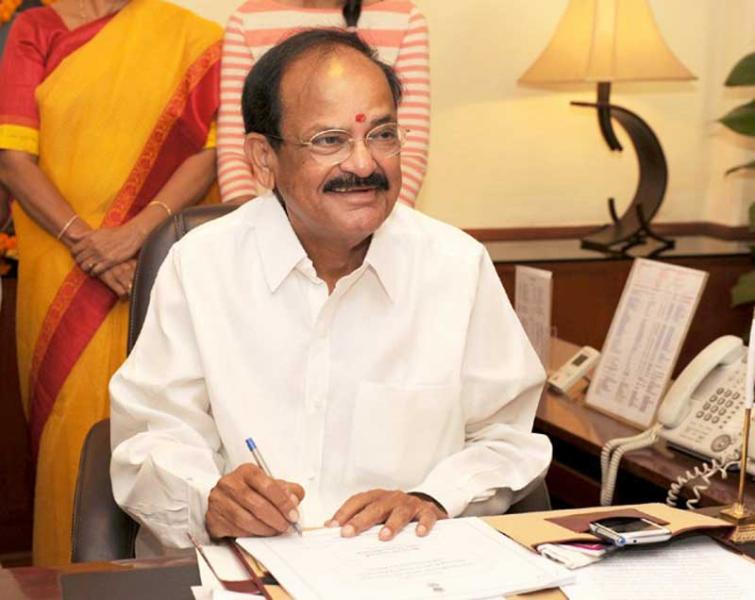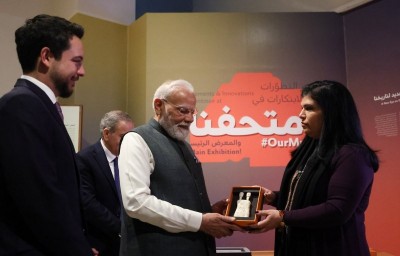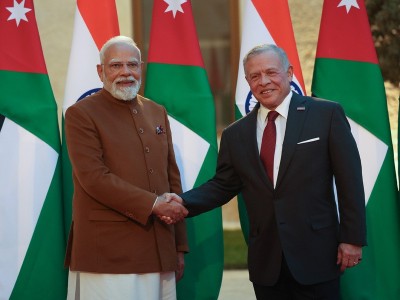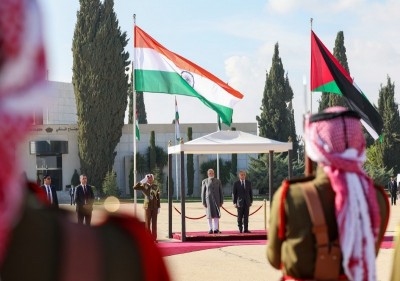
Vice President Naidu cautions against dysfunctional legislatures
New Delhi, June 21 (IBNS): Vice President and Rajya Sabha Chairman, M Venkaiah Naidu has cautioned MPs about the growing perception that democracy is in danger through “dysfunctional legislatures” and advised them to recalibrate their ways of thinking and acting.
In his observations to the House, Naidu recalled the concern he had expressed time and again about disruptions and the negative public perception arising out of “this dysfunctional state of affairs”.
Observing that substantial loss of functional time results in very low productivity, pendency of crucial legislations and lapse of some Bills on dissolution of the Lok Sabha, he said that every Question Hour lost means an opportunity to seek answers from the government on eight issues of policy implementation and governance by 40 members.
Stating that he was deeply disturbed by the recent happenings in the House, the Chairman said that people were equally getting disturbed and disillusioned with the way the House was functioning.
“The trust and confidence of people in our institutions is getting eroded. This downslide should end,” he added.
Pointing out that people of the country want the august House to be a performing one, Shri Naidu said as the House of Elders, we need to lead by example. This is a privilege that people bestow on a few. The expectations are high. He warned “If we fail we fail our people, we fail our nation, and we cannot allow this to happen”
Appealing to all Parliamentarians to make an inspiring fresh beginning with this session, he said “Our Parliament over the next few years has a very crucial role to play in the making of a New India by 2022 in which we all can take pride.”
Observing that India was an aspirational country with youth consisting almost two thirds of our population, he said citizens want to be active partners in development.
“Against this backdrop, we have to make our systems work better, make the institutions respond faster and the governance patterns altered to become more citizen-centric. We, in the Parliament, have an onerous responsibility,” he added.
Reminding the members that Rajya Sabha, being the house of elders has an added responsibility, he said “people expect from us a mature outlook, dispassionate and sensitive contemplation and meaningful deliberations on issues of public importance. We have to live up to their expectations and be role models for other legislatures.”
The Rajya Sabha Chairman also sought members suggestions on the automatic lapsing of bills in Rajya Sabha and on how to make Parliament a more effective forum of decision making.
The following is the full text of the observations made:
"Respected Leader of the House Shri Thawar Chand Gehlot ji, Respected Leader of the Opposition Ghulam Nabi Azad ji, Leaders of various parties in the House and Hon’ble Members of the August House !
I extend a warm welcome to all of you to this important 249th session of the House - the first session after the recent general elections and constitution of the 17th Lok Sabha. Though Rajya Sabha is a continuous House, this, in a way, is a new beginning for us as well.
Almost every one of you have been very actively involved in the recent elections reaching out to the people and gaining a deeper understanding of the hopes and aspirations of the people in a rapidly changing India.
Our country is set on yet another five year journey of making it’s tryst with destiny. Such a journey after every general election is always a defining moment in the making of our nation. It is a moment of honest reflection, renewed commitment and buoyant hope. The vibrant democracy of our country and the mandate given by the people gives us the confidence that, as a nation, we can make a huge leap and make the desired transformation happen, peacefully, harmoniously, inclusively and sustainably.
This is what the people of India want today. They want country to progress on different dimensions. They want a transparent, responsive, agile governance. They want the quality of their lives to improve. They want their voices to be heard. That’s where the role of all of us, Parliamentarians, comes in. To give voice to those ideas, those emotions, those yearnings for positive change.
Hon’ble Members,
You are the representatives of the people who have reposed their faith in you. When you enter the portals of this hallowed building, you bring with you millions of hopes and expectations from your respective constituencies. We have, therefore, a collective responsibility to live up to these expectations.
We have, now, yet another opportunity to redeem our pledges to the people and the nation by debating issues of public importance, seeking solutions to intractable challenges and formulating laws that improve governance and the quality of the polity as well as transform the lives of people.
Hon’ble Members, since my assumption of the Office of the Chairman of this august House, I have been expressing time and again, my concern about disruptions of the proceedings of the House and the negative public perception arising out of this dysfunctional state of affairs. Substantial loss of functional time results in very low productivity, pendency of crucial legislations and the resultant lapse of some of these Bills on dissolution of the Lok Sabha.
Every Question Hour lost means an opportunity of seeking answers from the government on 8 issues of policy, implementation and governance by 40 members. Every Zero Hour lost means depriving 15 members from raising issues of immediate public importance. Similarly, if the House doesn’t function, about ten more members lose the opportunity of raising as many issues in the House.
Ultimately, this august House would be what you want it to be. A performing one or a dysfunctional one. People of the country want it to be a performing one. If you have other ideas, you owe an explanation to the people, the ultimate masters. There is a growing perception that our democracy is in danger through dysfunctional legislatures.
Our nation has just entered the 70th year of Republic. Legislatures and their Hon’ble Members should discharge their noble responsibilities. As the House of Elders, we need to lead by example. This is a privilege that people bestow on a few. The expectations are high. Our responsibilities are onerous. We can ill afford to regret over lost opportunities we have had.
If we fail, we fail our people, we fail our nation. We cannot allow this to happen. We need to reassure each citizen that we can bring about a distinct change and that change shall begin with each political party and each member of this House.
Hon’ble Members,
Thorough, carefully considered and expeditious disposal of business is the touchstone of our efficiency.
In this context, I would like to mention a few issues that seem to be impeding speedy passing of Bills.
The Bills passed by the Lok Sabha and pending in the Rajya Sabha lapse with the dissolution of the House of the People. They have to be reintroduced in the Lok Sabha and the entire process has to be gone through afresh. This means a lot of delay. Can we make any change in this regard?
The Houses of Parliament seems to lose a lot of time in disruptive expression of adversarial positions. Can we change this approach and improve the quality of debates and make decision making a little quicker than now?
Quite a few bills are pending in Rajya Sabha for decades without required consideration. Should we continue them or treat them as lapsed?
Let me elaborate on each one of them and suggest we collectively think of feasible solutions to each of them.
Dissolution of Lok Sabha and lapsing of Bills in Rajya Sabha
Under the provision of Article 107 of the Constitution, Bills passed by the Lok Sabha during the course of it’s five year term and pending in Rajya Sabha get lapsed with the dissolution of the House of the People. Accordingly, 22 Bills passed by the 16th Lok Sabha and were pending in the Upper House got lapsed.
In effect, Lok Sabha has to take up these 22 Bills again for consideration and passing. I am afraid it would take a minimum of two sessions for doing so. And this means that the efforts of Lok Sabha for passing these 22 Bills have been rendered waste. The Bills that got lapsed in Rajya Sabha were important from the socio-economic transformation of our country.
The lapsed Bills include;
The Land Acquisition Bills passed by Lok Sabha in 2015,
Factories (Amendment) Bill passed in 2016,
The Motor Vehicles (Amendment) Bill, 2017,
The Consumer Protection Bill, 2018,
The Arbitration and Conciliation Bill, 2018,
The Companies (Amendment) Bill, 2019,
The Banning of Unregulated Deposit schemes Bill, 2019,
The Aadhar and Other Laws (Amendment) Bill, 2019,
Triple Talaq Bills of 2017 and 2018,
The Trafficking of Persons (Prevention, Protection and Rehabilitation) Bill, 2018,
The Citizenship (Amendment) Bill, 2019 etc.
As all of you would appreciate, it takes considerable time and energy to get a Bill passed in either of the Houses of Parliament. Given the implications for the functioning of the Parliament and the impact of the Bills getting lapsed on the much desired transformation of our country, there is a need to rethink the provision regarding the lapsing of the Bills in the Upper House of the Parliament.
I suggest a wider debate on the matter of automatic lapsing of Bills in Rajya Sabha.
Pendency of Bills in Rajya Sabha
At the end of the last and the 248th session of Rajya Sabha, a total of 55 Bills were pending consideration in this House. After the lapsing of the 22 Bills that were referred to earlier, the pendency in this House now stands at 33 Bills. Three bills are pending for more than 20 years, six bills are pending between 10-20 years, 14 bills are pending between 5-10 years and 10 bills are pending for less than 5 years. The oldest pending bill, The Indian Medical Council (Amendment) Bill, 1987, has been pending for more than 32 years. This is certainly not a happy situation. These pending Bills include;
The Constitution (79th Amendment) Bill, 1992,
The Provision of the Municipalities (Extension to the Scheduled Areas) Amendment Bill, 2001,
The Seeds Bill, 2004, The Pesticides Management Bill, 2011,
The Mines (Amendment) Bill, 2011, The Inter-State Migrant Workmen (Amendment) Bill, 2011,
The Indecent Representation of Women (Prohibition) Amendment Bill, 2012,
The Building and Other Construction Workers Related Laws (Amendment) Bill, 2013,
The Wakf Properties (Eviction of Unauthorised Occupants) Bill, 2014 etc.
As the titles suggest, all these long pending Bills relate to important issues that merit timely consideration and passing. Such long pendency does not reflect well on the functioning of the Parliament.
In order to streamline the process, I suggest that if a Bill is not taken up for consideration and passing in Rajya Sabha within five years of introduction of such Bills, such pending Bills should be treated as deemed to have lapsed. Let us have a wider debate in this regard as well.
Parliament: How do we make it a more effective forum of debate and decision making? How do we seek the “meeting ground” rather than the “zone of divergence”?
Hon’ble Members !
I would, now, like to invite your attention to another important dimension of the functioning of our Parliament.
We should examine the reasons why there was a wide gap between the number of bills passed by the 16th Lok Sabha and the Rajya Sabha, especially when compared to the 15th Lok Sabha.
I am not for a moment suggesting that one House of the Parliament should blindly follow the other House. Careful consideration by both Houses is absolutely required. Informed debates and reasoned argumentation is the heart of Parliamentary democracy.
During the debates in the Constituent Assembly and thereafter on the need for second chamber of Parliament i.e Rajya Sabha, several luminaries including Dr.S.Radhakrishnan stressed that Rajya Sabha should act as a ‘check’ on the hasty legislation spurred by the possible political considerations in the other House but not to obstruct the very course of legislation by the Parliament.
All the stakeholders need to give a serious thought to this decision making process and see if dialogue and debate can follow the path of consensus building and searching for the ‘meeting ground’ or the ‘zone of convergence’ rather than expanding the ‘zone of divergence’.
Verdict 2019: The Message and Mission for Parliament
While every electoral verdict carries its own message to those who are elected, we have now a different context in India. Ours is an aspirational country with youth consisting almost two thirds of our population. This is a huge untapped demographic dividend. We have an increasingly active citizenry wishing to be active partners in development and expecting efficient delivery of services and expeditious delivery of justice. Against this backdrop, we have to make our systems work better, make the institutions respond faster and the governance patterns altered to become more citizen-centric. We, in the Parliament, have an onerous responsibility.
The Mission before all of us now is to clear all the cobwebs and remove hurdles that come in the way of rapid socio-economic transformation of our country.
To realize the vaulting aspirations of our people cutting across the boundaries of caste, creed, region and religion, Parliamentarians need to redefine and recalibrate their ways of thinking and acting and have to make a clear break from the past.
We have to be more agile, forward looking and capitalize on our collective wisdom. NITI Ayog and the Government have come out with a vision and a set of goals for 2022. Our Parliament over the next few years has a very crucial role to play in the making of a New India by 2022 in which we all can take pride.
As Vice President of India and Chairman of this august House and as an individual with some years of experience in public life, I fervently appeal to all Parliamentarians to make an inspiring fresh start beginning with this session.
It should be our collective duty to strive for better and effective performance. Rajya Sabha, being the House of Elders, has an added responsibility as a deliberative body and the people expect from us a mature outlook, dispassionate and sensitive contemplation and meaningful deliberations on issues of public importance. We have to live up to their expectations and be role models for other legislatures. The quality of our discourse and the way we conduct ourselves will define our contribution to public life.
I want that every issue be discussed and debated with utmost passion and sincerest conviction in this august House. I would certainly welcome such an enlightened debate because this will undoubtedly enhance the stature of this House.
Let us make our Parliament an institution that synergises our individual, intellectual and political thoughts and actions for the betterment of the lives of our people and for transforming our country to be among the best in the world.
It is an opportune time for us to reform the functioning of our Parliament so that we can collectively transform the lives of our people who have reposed immense trust in each one of us. Please think of every Indian before you debate or disrupt. Think of the India you wish to create.
We are all fortunate to have an opportunity to shape our country’s destiny, an opportunity that comes rarely to only a select few. We must use it wisely.
The present dysfunctional, disruptive environment must change.
We must use the time available for Parliamentary debates most productively. Infact, we may actually require more time given the ever widening range of public issues emerging every day. However, our foremost task is to use the existing time in a fruitful manner.
I have been getting deeply disturbed by the recent happenings in the House and I get a feeling that many people are getting equally disturbed and disillusioned with the way the House is functioning. The trust and confidence of people in our institutions is getting eroded. This downslide should end.
We cannot allow any further weakening of our democratic structures. Together, we must restore the stature and dignity of the House and set an example to other legislative bodies in the country. I urge all political parties to reflect on the current decline and stem the rot as soon as possible. Let us show that change is possible and that we can make it happen.
I fervently hope that the issues I have raised and concerns I have voiced will receive utmost consideration by all of you and other stakeholders.
Thank you for your patient hearing.
Jai Hind !"
Support Our Journalism
We cannot do without you.. your contribution supports unbiased journalism
IBNS is not driven by any ism- not wokeism, not racism, not skewed secularism, not hyper right-wing or left liberal ideals, nor by any hardline religious beliefs or hyper nationalism. We want to serve you good old objective news, as they are. We do not judge or preach. We let people decide for themselves. We only try to present factual and well-sourced news.







